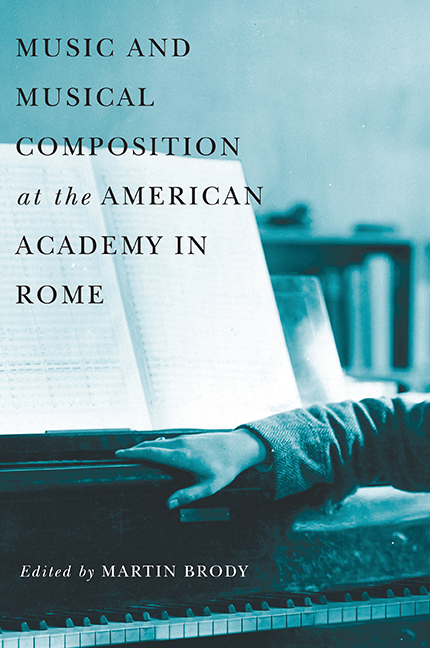Book contents
- Frontmatter
- Contents
- List of Illustrations
- Introduction
- Part One A History of the Rome Prize
- 1 The Rome Prize from Leo Sowerby to David Diamond
- 2 A History of the Rome Prize in Music Composition, 1947–2006
- Part Two Origins, Ideology, Patronage
- Part Three Two Case Studies in Internationalism
- Part Four Primary Sources
- Appendix: Composers at the American Academy in Rome, 1921–40
- Selected Bibliography
- List of Contributors
- Index
1 - The Rome Prize from Leo Sowerby to David Diamond
from Part One - A History of the Rome Prize
Published online by Cambridge University Press: 25 October 2017
- Frontmatter
- Contents
- List of Illustrations
- Introduction
- Part One A History of the Rome Prize
- 1 The Rome Prize from Leo Sowerby to David Diamond
- 2 A History of the Rome Prize in Music Composition, 1947–2006
- Part Two Origins, Ideology, Patronage
- Part Three Two Case Studies in Internationalism
- Part Four Primary Sources
- Appendix: Composers at the American Academy in Rome, 1921–40
- Selected Bibliography
- List of Contributors
- Index
Summary
Fascination with Americans living in post–World War I Europe remains tremendous. Much has been written about American expatriate musicians in Paris: Aaron Copland, Virgil Thomson, Roy Harris, and others studied privately with Nadia Boulanger. Less appears in print about the European experience of equally important composers, such as Howard Hanson, Randall Thompson, Roger Sessions, and Samuel Barber, who won the Rome Prize during the interwar period. There, too, an important composition teacher, Ottorino Respighi, influenced Americans. These composers were being assimilated into the European experience while paradoxically creating an American musical identity.
Rome Prize winners have been competitively selected every year from 1921 through the present, except between 1942 and 1949, the period during and after America's participation in World War II. This study will therefore close in 1942. Rome Prize winners, or Fellows of the American Academy in Rome (FAAR) in Academy jargon, do not include Residents of the American Academy in Rome (RAAR), who began to be asked to stay at the Academy in the late forties. This article discusses the twenty-two Rome Prize fellows during the period 1921 to 1942 and their professor in charge, Felix Lamond.
The American Academy in Rome was founded in 1894 for architects and classicists, and not until 1920, after the Great War, was funding found to include composers. The Academy founder, the architect Charles Follen McKim, had died in 1909 and did not live to see the music fellowships he had endorsed. McKim designed the main Academy building. Henry Higginson, who established the Boston Symphony Orchestra, whose hall McKim had also designed, was a trustee from 1905 to 1909. The composer Edward MacDowell, a trustee of the Academy in 1905, left the board shortly afterward because of his health. He had urged the establishment of a music program: “For years it has been my dream that the Arts of Architecture, Painting, Sculpture and Music should come into such close contact that each and all should gain from this mutual companionship. That students in all these arts should come together under the same roof, and amid such marvelous surroundings, seems almost too good to be true.” There was, however, no money to pursue this ideal in 1905. His wife Marian founded the MacDowell Colony in New Hampshire, based on similar principles, after MacDowell's death in 1908.
- Type
- Chapter
- Information
- Publisher: Boydell & BrewerPrint publication year: 2014



